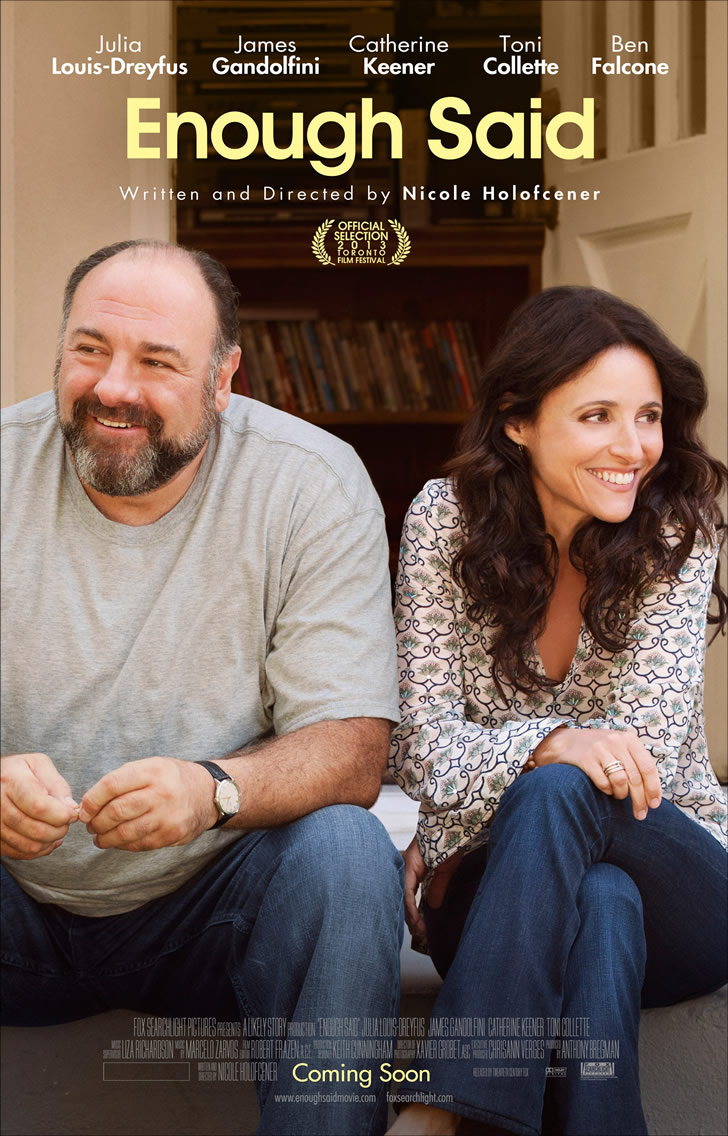 Genuine is a word used to define very few things – usually beer; but it’s a word that gets to the heart of Nicole Holofcener’s vision for “Enough Said.â€
Genuine is a word used to define very few things – usually beer; but it’s a word that gets to the heart of Nicole Holofcener’s vision for “Enough Said.â€
The Julia Louis-Dreyfus/James Gandolfini romantic comedy is filled with moments that feel true to life and that I myself have gone though. Writer/director Nicole Holofcener’s keenly observed behavior is what sells this movie. It also lets the viewer see that James Gandolfini was truly an actor and not just a mob boss on some show on a cable network years ago. His depth as an actor is on full display here. He makes you smile, chuckle and care for him in a way that makes you truly wonder why you haven’t seen more of his movies.
Gandolfini who plays Albert is serendipitously brought together with Julia Louis-Dreyfus’ Eva. Together the lovers embark on a relationship journey rarely seen on screen; that of the middle aged divorcee. Still, like any other relationship movie, especially a romantic comedy it boils down to two people drawn together and then brought at odds with each other.
Holofcener’s ability to unearth qualities we didn’t know existed in familiar performers. Louis-Dreyfus is still very funny/awkward in “Enough Said,” which is something of a specialty of hers, but she’s also completely believable as a befuddled massage therapist who knows her life is on the brink of something but can’t figure out what. And Gandolfini is warm and soulful as Louis-Dreyfus’ lover, who seems to be a perfect fit until she realizes he is the ex-husband of a new friend and new-age poet/hippie Marianne, played capably by Catherine Keener.
The movie also brings up a point that is rarely talked about in real life and especially on screen. How do you talk about your former husband/wife? Sure we have the bff that trashes the ex but that is a trope used to often. And the friends in this movie do very little to trash the ex’s which was refreshing. This movie brings the question up multiple times and with bravado unseen in the rom/com genre. Kenner was excellent as a foil to Eva’s relationship with Albert but the beauty of it was that it was unintentional.
Beauty is defined by what each of us wants in a person, but when we have all that we want and allows our view to be colored by the experiences of another are we truly likeable? It is a point of view that Holofcener wants you to ponder. At least I asked it as I left the theater. Just because one person didn’t like another for their quirks or misgivings, doesn’t mean that y someone else wouldn’t find those qualities appealing.
But it’s the qualities that are present in Eva and Albert that make it both sad and funny. Like a scene where Gandolfini and Louis-Dreyfus share an intimate moment she says, “I’m tired of being funny.” “Me, too,” Albert agrees, to which she replies, “But you’re not funny.”
I don’t think there’s been a movie this year packed with enough of these honest and heartbreaking moments.
I think I’ll go watch it again and hope those onion-slicing ninjas don’t sit next to me.

Leave a Reply